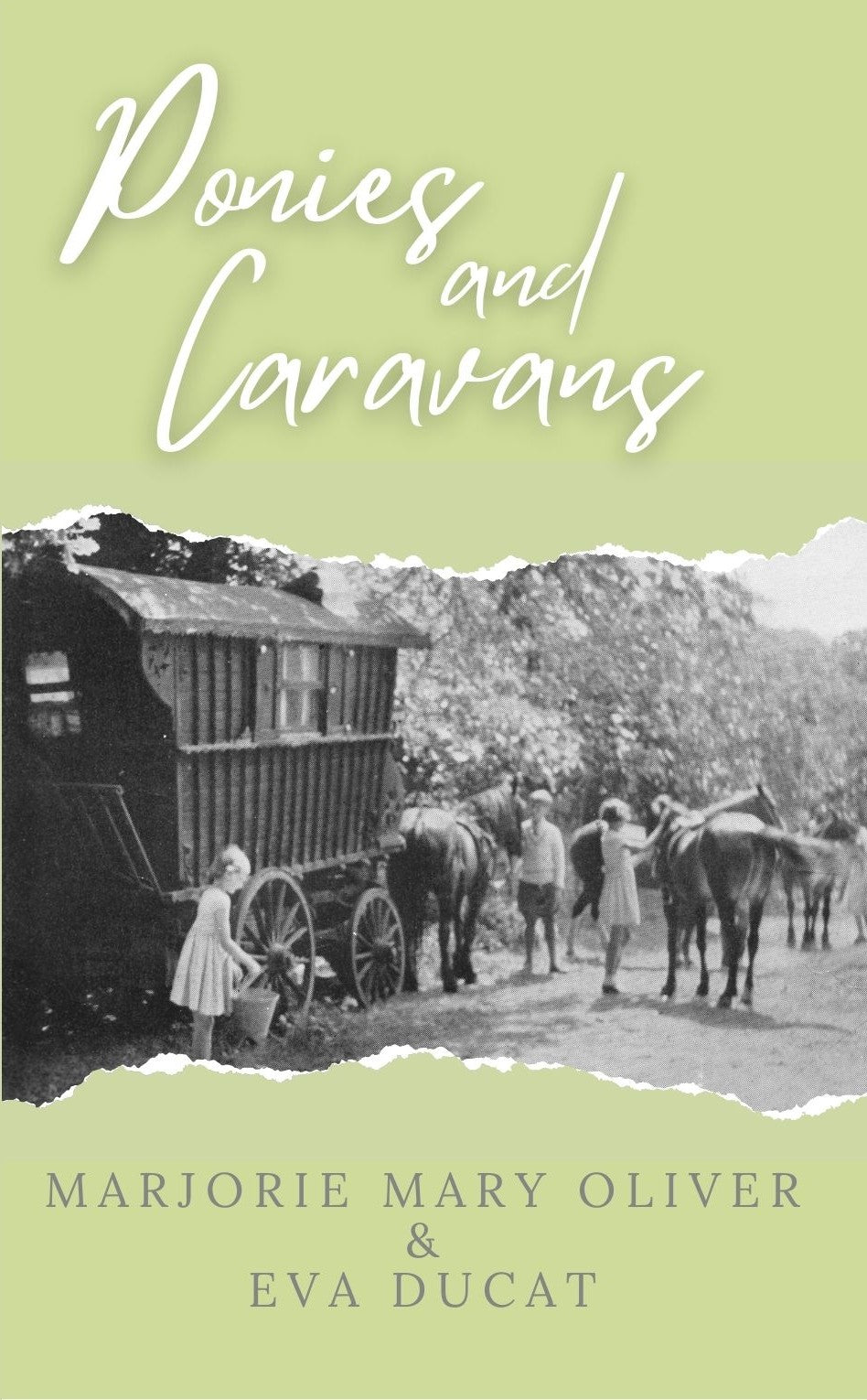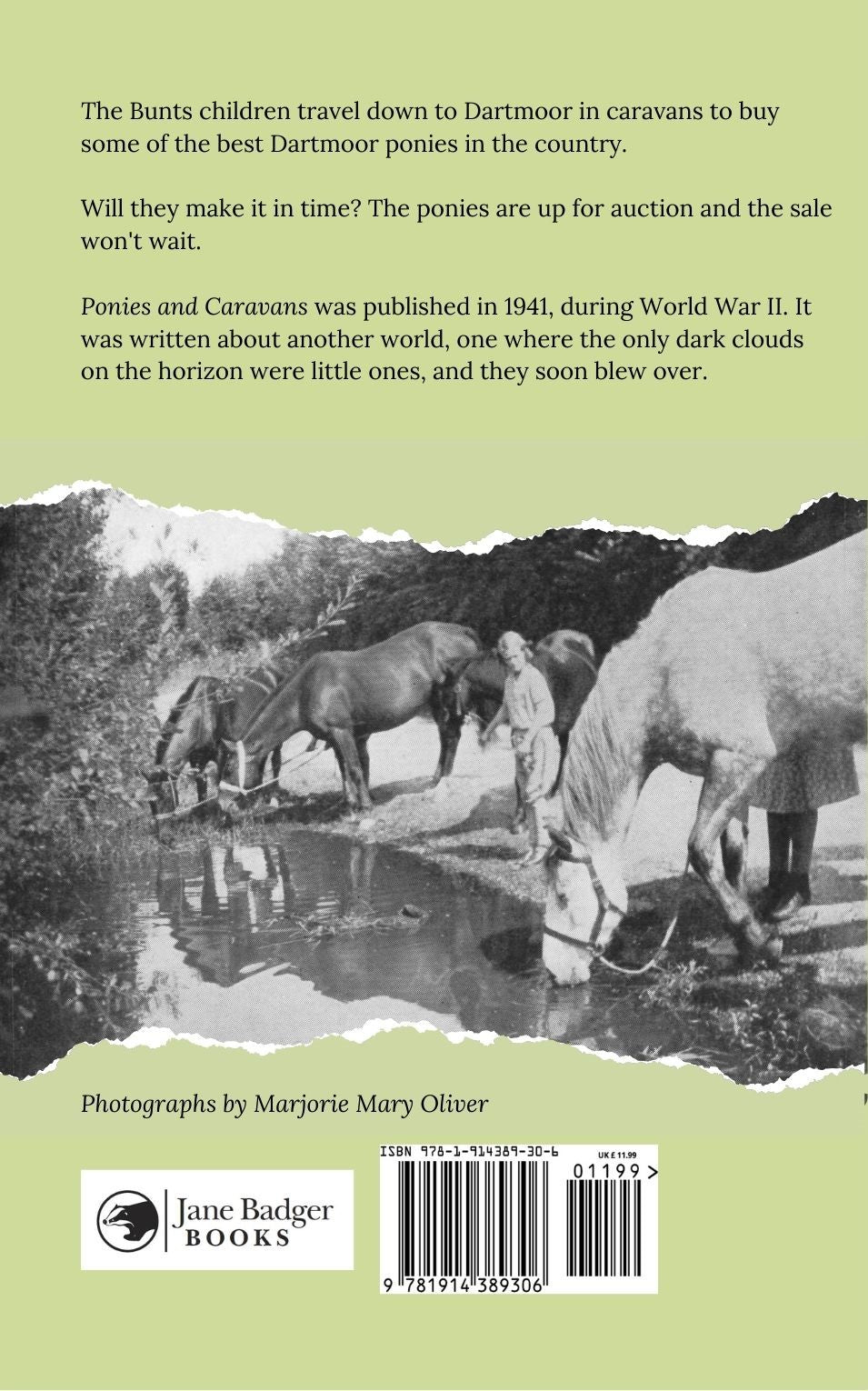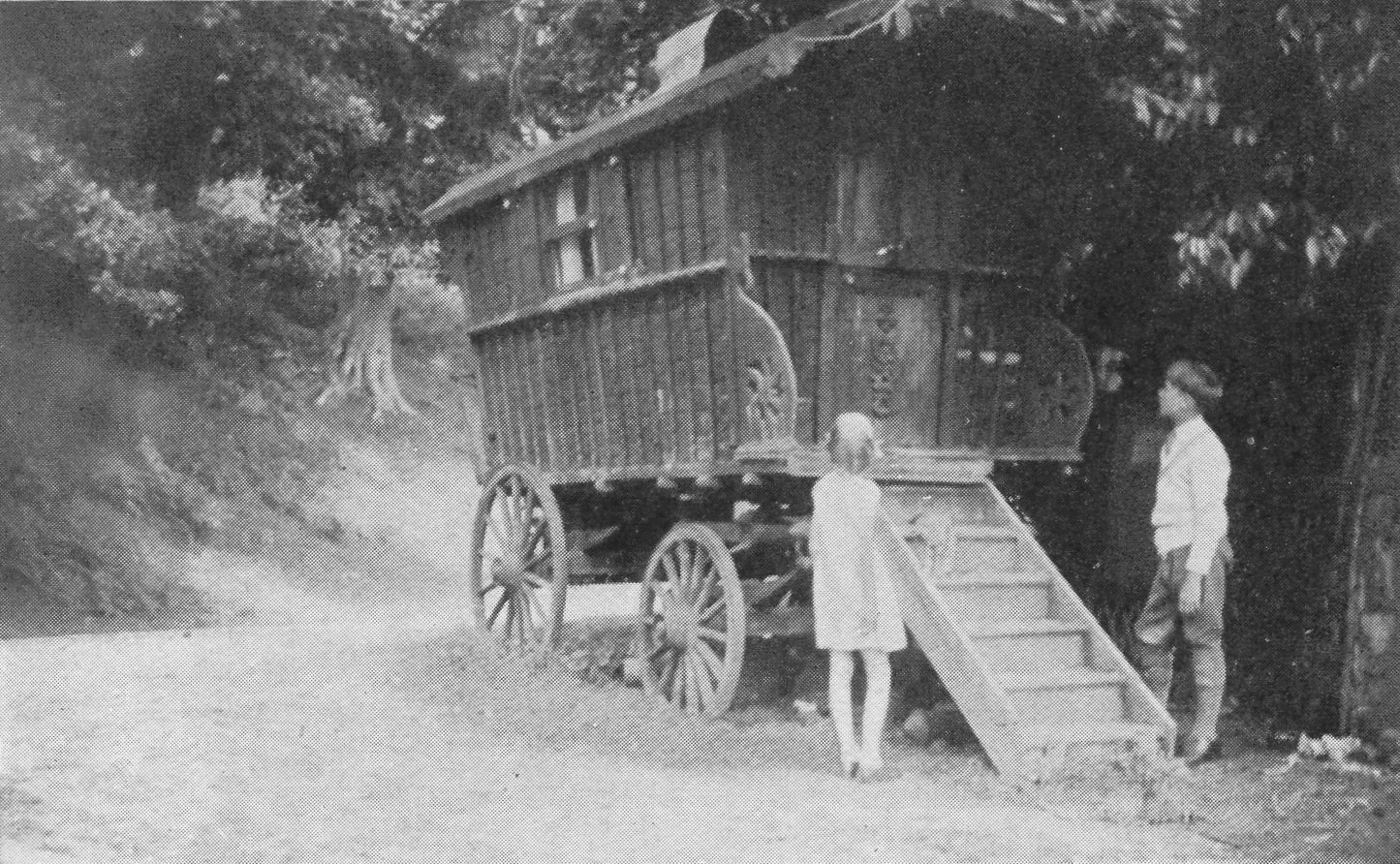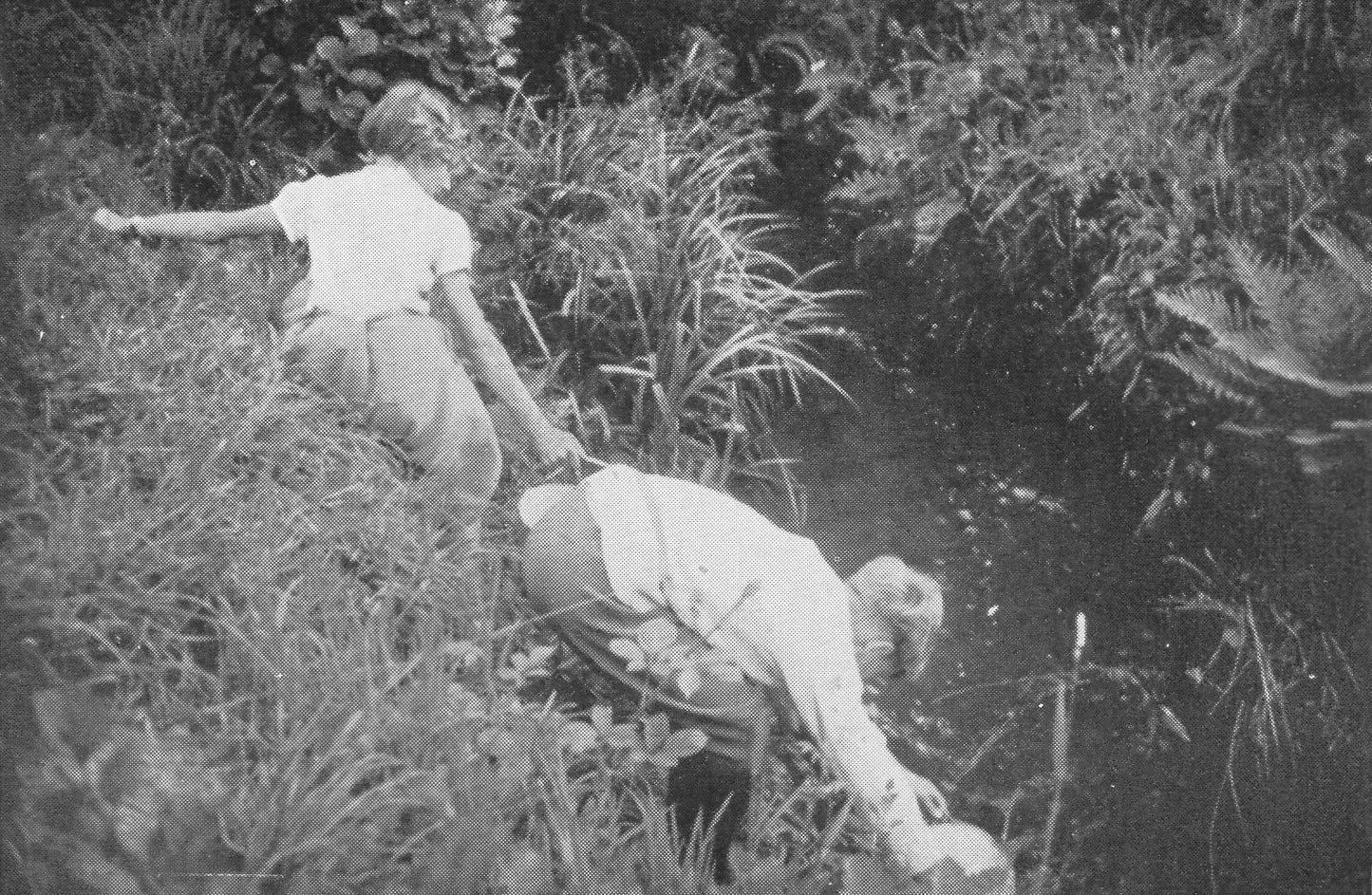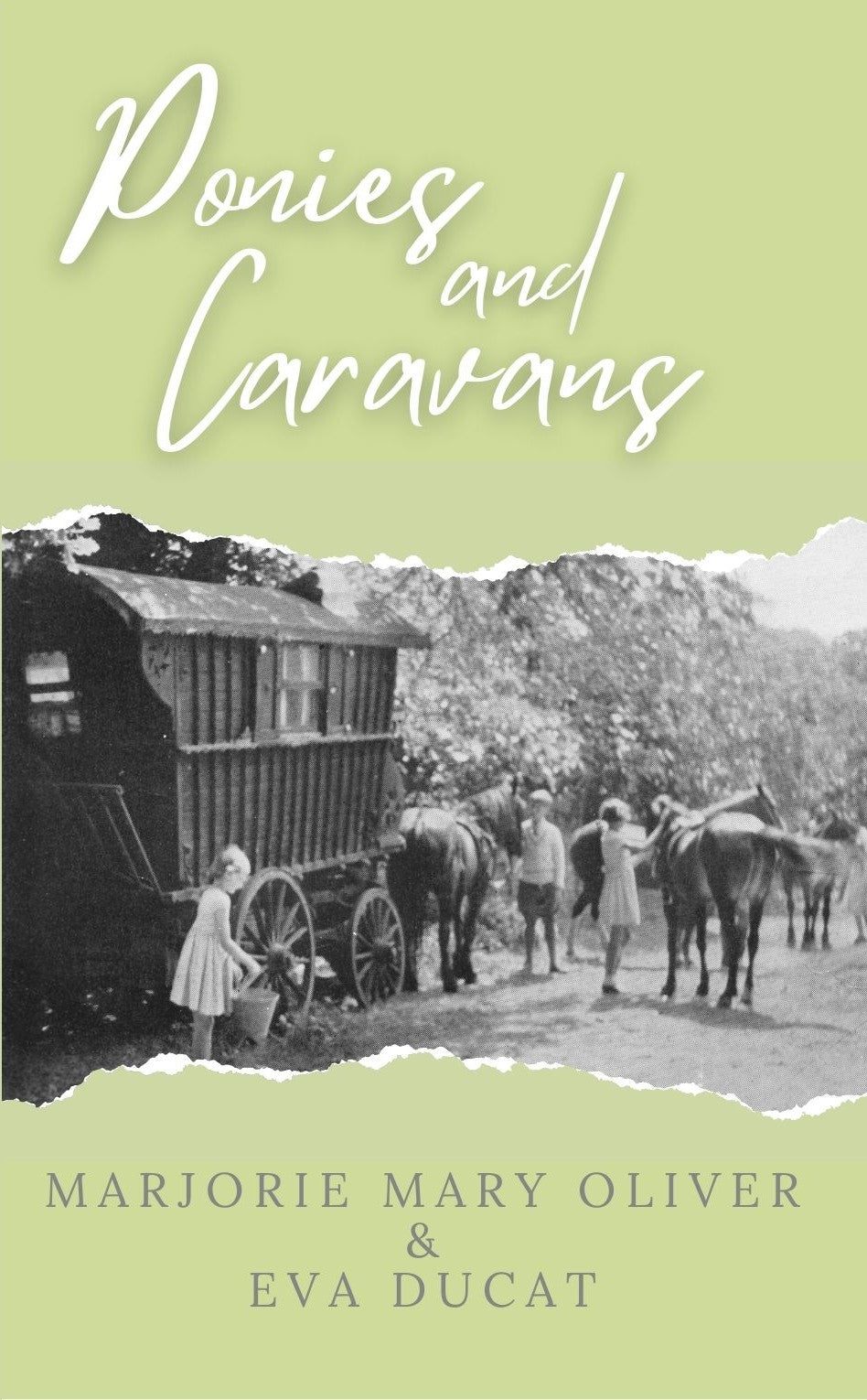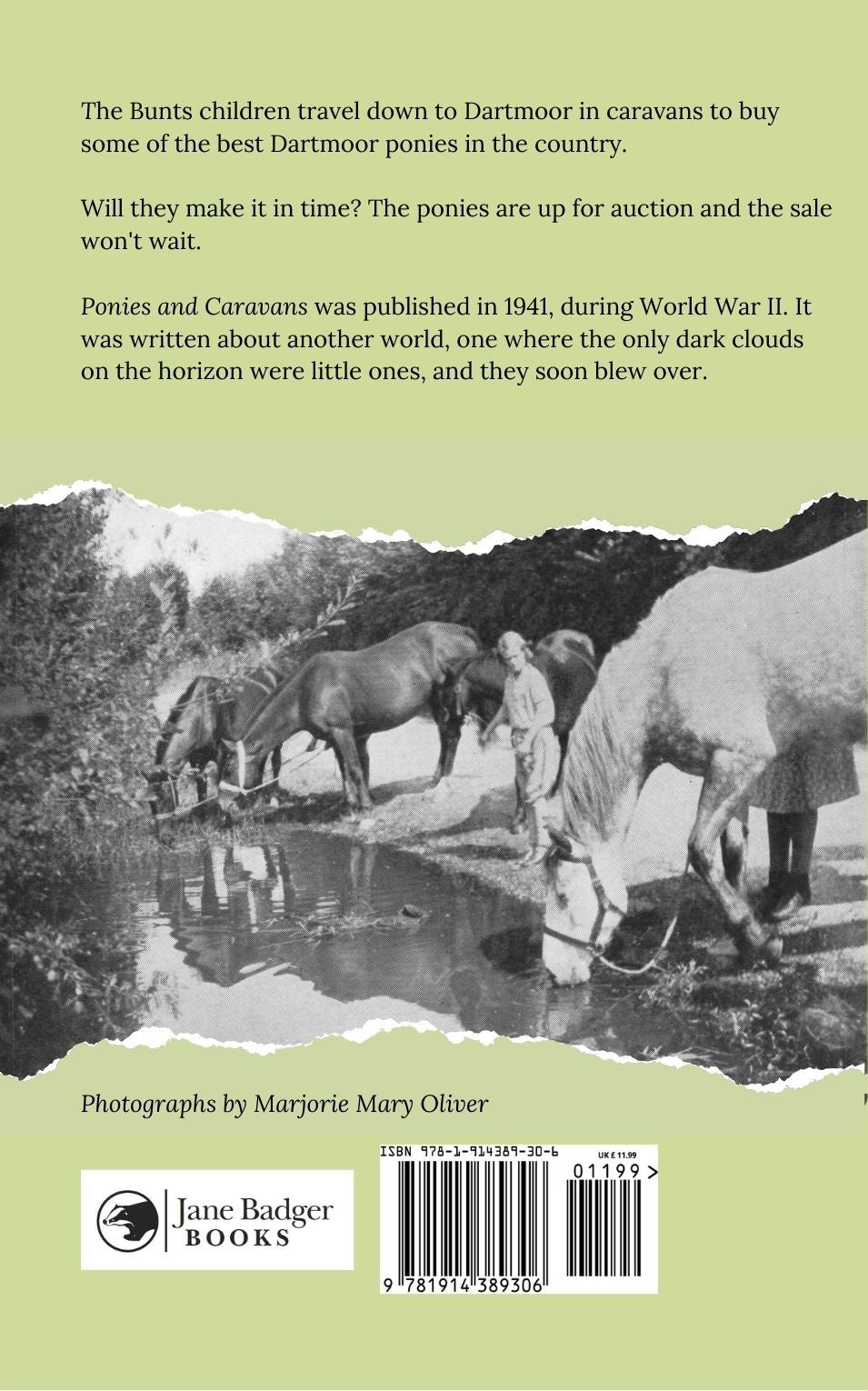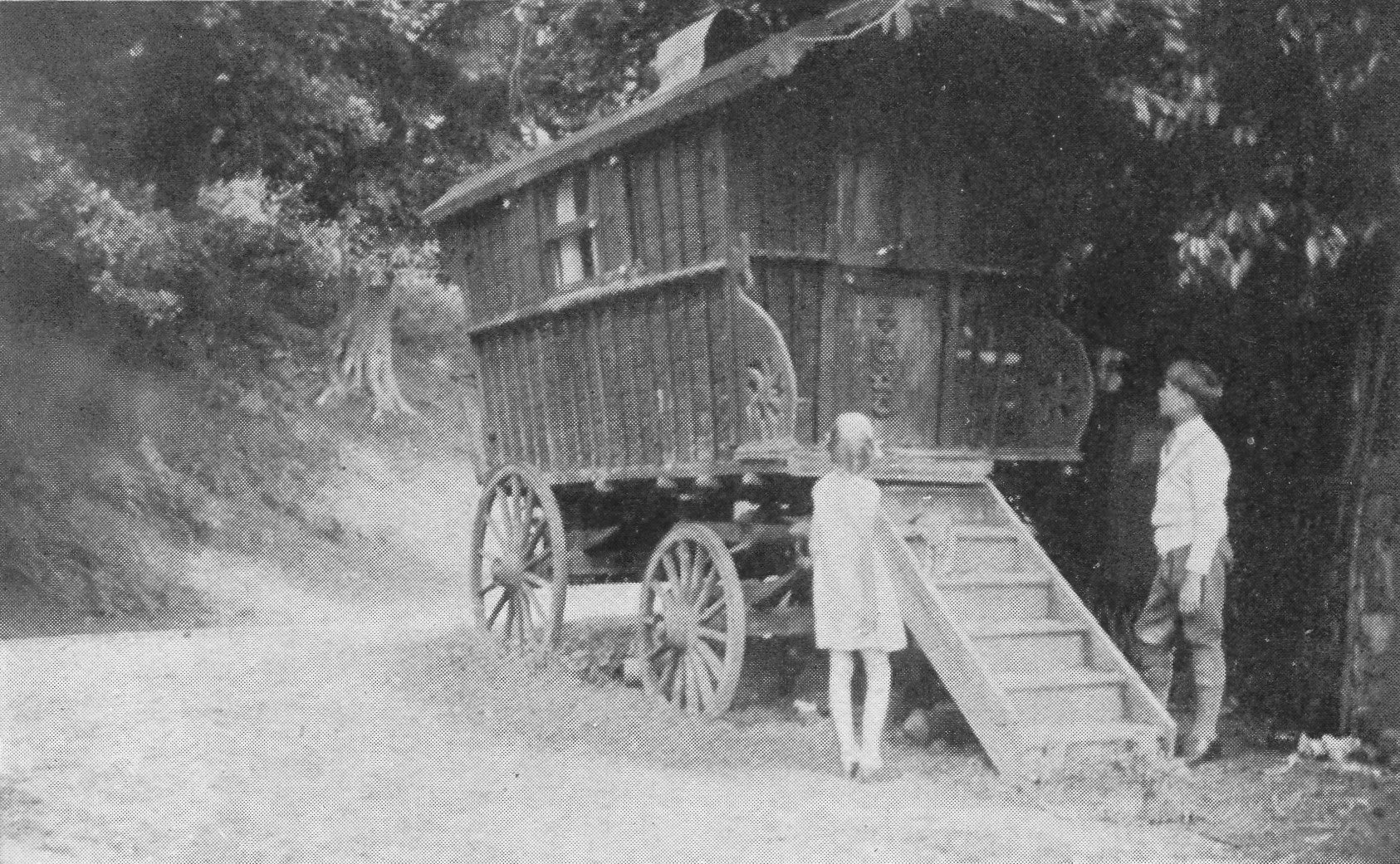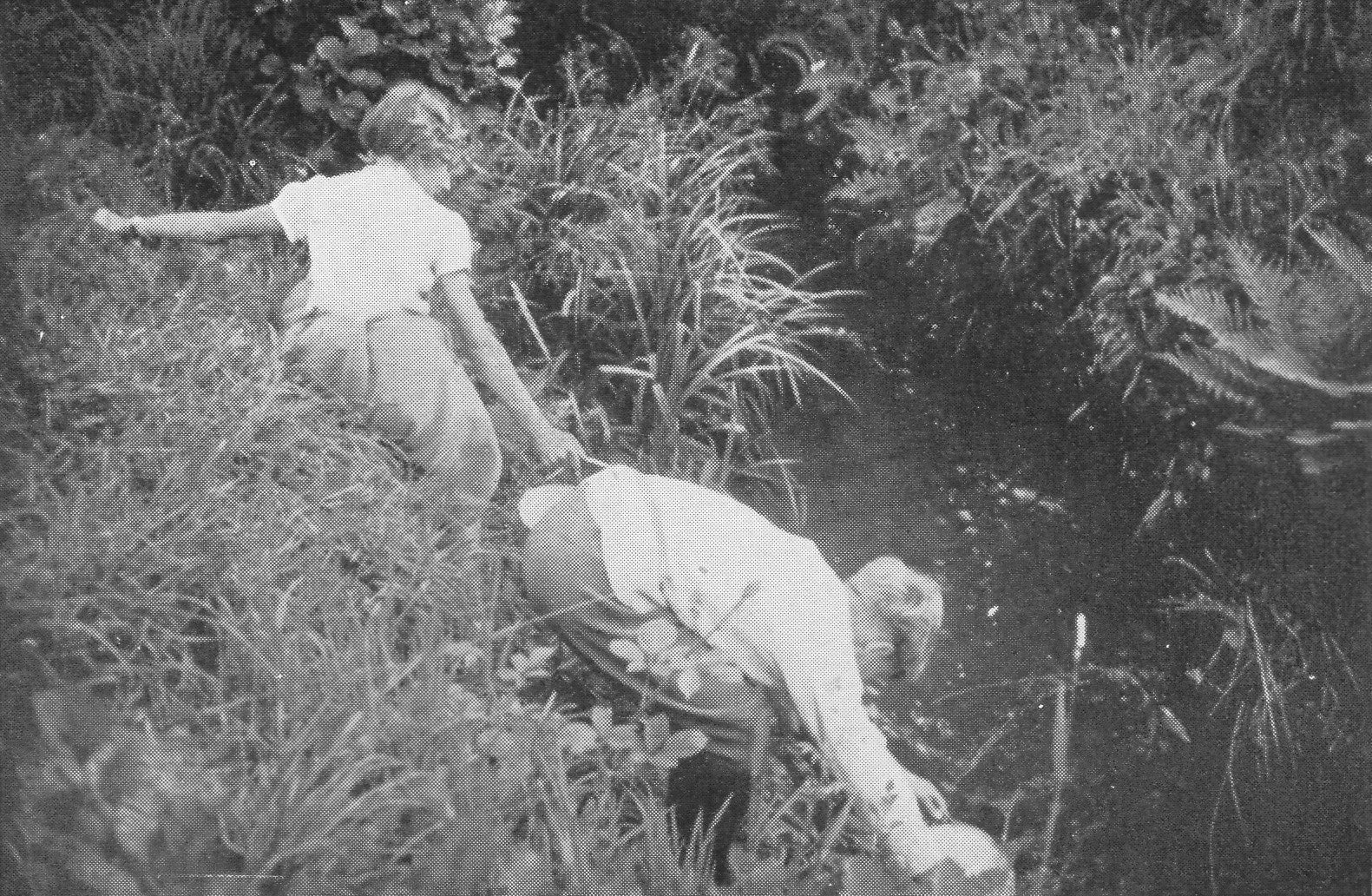Jane Badger Books
Marjorie Mary Oliver & Eva Ducat: Ponies and Caravans (paperback)
Marjorie Mary Oliver & Eva Ducat: Ponies and Caravans (paperback)
Illustrator: "Jenefer"
Couldn't load pickup availability
Share
The Bunts children travel down to Dartmoor in horse-drawn caravans to buy some of the best Dartmoor ponies in the country.
Will they make it in time? The ponies are up for auction, and the sale won't wait.
Ponies and Caravans was published in 1941, during World War II. It was written about another world, one where the only dark clouds on the horizon were little ones, and they soon blew over.
Bunts series 3
Page length: 228
Original publication date: 1941
When will I get my book?
When will I get my book?
Paperbacks are printed specially for you and sent out from our printer. They are on a 72-hour turnaround from order to being sent out. Actual delivery dates will vary depending on the shipping method you choose.
Read a sample
Read a sample
“Hulloa! Has Uncle Edward come yet?” cried Bob, bursting noisily into the room.
“No, he told Mummie not to expect him till after tea,” answered Phyllis, looking up from her book.
“Well, anyway, school is over,” cried Bob, joyfully flinging his satchel full of books on the old sofa. “I think it’s the most glorious feeling in the world when the holidays begin!”
“I know. I felt just like that when we broke up this morning,” said Phyllis, in a despondent voice.
“It sounds as though the feeling had rather worn off now,” said Bob, looking in surprise at his sister’s serious face.
“M’m,” she answered, nodding her head slowly; “this morning it seemed enough just to feel that there would be no more lessons until the end of September; but now I have had time to remember that we can’t go away, like everyone else in the summer, and that, for the next two months, we shall be stewing in this beastly place, with no fields, and no animals, and nothing to look at but houses, houses, houses, all exactly alike.”
“Yes, I know—but I expect something will turn up,” said Bob, whose optimism was unquenchable; “and, anyway, Uncle Edward is coming this evening,” he added, as if that one delightful fact ended all difficulties.
“Open the door, darlings,” called Mrs. Russell, and Bob went to the door and took a tray of tea-things from his mother.
There was only one living-room in the little suburban house, so it had to be used, not only as dining-room and sitting-room for Mr. and Mrs. Russell, but play-room for the two children as well.
Bob, who was thirteen, would often have enjoyed a good rough-and-tumble game in spite of the smallness of the room; but although Phyllis was only eleven she was usually to be found curled up in a chair with a book, her thoughts far away, and she had ceased to be much of a playmate to him.
“I have brought in some doughnuts to celebrate the first day of the holidays,” said Mrs. Russell.
“Hooray! Hooray! Doughnuts for tea,” shouted Bob; “Hi, Phyllis, do you hear? Doughnuts for tea.”
Phyllis had already returned to her book. “What?” she asked, looking up dreamily. “Oh, I’m sorry, I didn’t see,” and she got up and helped her mother to lay the tea.
“I do hope Uncle Edward has some good stories to tell us about his animals,” said Bob presently, when they were all three seated round the tea-table; “when I grow up I am going to be a vet. like him.”
“A girl at school didn’t know what a ‘vet.’ was,” said Phyllis disgustedly; “I had to tell her he was the animals’ doctor. I only wish I could be a vet. myself,” she continued; “do they ever have ‘lady’ vets., Mummie?”
“I don’t know, darling; you must ask Uncle Edward,” answered Mrs. Russell vaguely. She worked so hard, and had so many things on her mind, that she seldom paid much attention to her children’s questions. They found a more reliable source of information in their father, but he was away at the office all day, and came back too tired to do more than read his paper and smoke his pipe undisturbed. That was why it was such a treat when Uncle Edward came to stay; he never seemed too tired to answer their questions, and would tell them endless tales about the animals he visited and cured.
“Mummie, you’ve always promised that one day you would take us to see Uncle Edward; I suppose we couldn’t possibly go these holidays?” asked Phyllis, wistfully.
Mrs. Russell shook her head sadly, but quite positively.
“No, darling, you know we can’t afford it. Daddy won’t get a holiday this summer, so in any case I couldn’t leave him, and, even if we could go, Uncle Edward’s cottage is too small for us to stay in, and we couldn’t afford to take rooms.”
“Do rooms cost such a frightful lot?” asked Phyllis.
“Yes, darling. In the summer I am afraid they do,” answered poor Mrs. Russell.
“A chap at school spent last holidays in a caravan,” volunteered Bob, starting on his third doughnut. “It sounded awful fun. I meant to tell you about it before, because they did everything themselves, so it couldn’t have cost much.”
“Oh, Bob! Why didn’t you think of it sooner?” cried Phyllis, her eyes shining with excitement. “Of course, it’s the very thing. If we went in a caravan, Mummie, there wouldn’t be any railway fare and we shouldn’t need rooms. Oh, do let us go in a caravan.”
Mrs Russell shook her head. “I know it sounds lovely, darling; but how are we to get a caravan? It would cost at least fifty pounds to buy one, and if we had one, Daddy couldn’t get away this summer. No, we must make up our minds to do without a holiday this year; but I’ll tell you what we will do: we’ll all go to Southend for the day, as we did last year, and take our lunch and tea with us and have a splendid picnic.”
“Then we can bathe again,” said Bob; “but, oh! I do wish I could have a pony and ride,” he added unexpectedly. “You don’t know how I long for a pony,” he continued, sighing deeply as he remembered the blissful holidays when a friend let him share his little Dartmoor pony and ride occasionally.
“Southend is nothing but houses and people,” cried Phyllis; “it’s no better than this place; and oh! Mummie, I do so long for fields and flowers and animals,” she added piteously; and she shook her long brown hair forward to hide the tears in her eyes.
“Never mind, darling, you shall have them one day,” answered Mrs. Russell with easy vagueness.
This really was not very comforting, and it was the most fortunate thing that just at that moment a car stopped at the door.
“Uncle Edward!” shouted Bob, rushing from the room. Phyllis brushed the tears so hastily from her eyes that she arrived at the front door almost as soon as he did, and both flung themselves on the tall, kindly-looking man standing beside the car.
“Uncle Edward! Uncle Edward!” they cried. “You’ve come at last! We’ve been longing to see you. Oh, how glad we are you’re here!”
Now the delightful thing was that their uncle seemed just as pleased to see them as they were to see him, and returned their hugs and greetings with the utmost cordiality. They were just on the point of dragging him into the house, hanging one on each arm, when he said: “Stop, not so fast. There are some things to fetch in from the car.”
So saying he began diving into the back of it and bringing out, not only a suitcase, but various parcels, which he handed out one by one.
“That’s the pair of chickens I’ve brought for your mother,” said he, handing out two splendid birds as he spoke to Bob; “and that’s a pound of butter from the farm with the Jersey cows. Now mind how you carry that box, and don’t drop it, for those are the eggs; and here is a pound of honey I’ve brought you children. It’s the first of the year, and I thought you might as well have it; and now,” he continued, making a final plunge into the car, “I hope these flowers aren’t dead, but it’s hot weather for them. By Jove,” he added, straightening himself up on the pavement, “you are hot here—about ten degrees hotter than the country, I should say. Do put those flowers straight into a bucket of water, Phyllis, and perhaps they’ll revive.”
“I never smelt anything so lovely,” cried his niece, burying her little nose deep in the lovely cottage bunch of mixed flowers. “Oh, Uncle Edward, what heavenly things you do bring us! Bob and I were longing for the country when you came, and now it feels as if you had brought a whiff of it with you.” As he stood laughing and talking to the children, it was ludicrous to see how much alike Uncle Edward and Bob were. Bob was so like him that he looked a smaller edition of his uncle. They both had the same wide face, snub nose, blue eyes, and red hair. Both faces had the same open, friendly expression. The only difference between them was that Bob’s skin was not tanned by the weather, and instead of his face being rather red like his uncle’s, it was pale and had a great number of freckles.
Uncle Edward was far too kind, and too polite, to say how hot and stuffy he found the little house when he got into it; but he thought to himself, as he greeted his sister and sat down for a cup of tea, that he was not surprised the children longed to get into fresh air and away from bricks and mortar. It seemed to him quite stifling in the little room and outside the glare of the sun on the pavement made it even hotter. He felt sorry for the children; they looked so white and languid.
Now that they had their beloved Uncle Edward, however, the children were not at all sorry for themselves, and directly tea was over they prepared for a delightful conversation.
“Now,” said they, perching themselves one on each arm of his chair, “tell us about the animals. Who’s been sick? Who’s had a pill? Was it a big one? Tell us exactly how big. Was it as big as my fist?” cried Bob hopefully.
Uncle Edward laughed. “How would you like to swallow a pill of that size?” he enquired. “No, no, the most exciting thing that’s happened was old Miss Porter ringing up at night to say there was a button missing off Phoo-Phoo’s coat and she was sure dear little Phoo-Phoo had swallowed it.”
The children laughed gleefully—they were well acquainted with stories of old Miss Porter and her beloved Pekingese dog, and were fully aware also of the war which raged between her and Uncle Edward’s housekeeper Mrs. Browning. Mrs. Browning’s bullying of Uncle Edward (whom she treated like a small boy) was only equalled by the ferocity with which she routed the people who tried to call him out unnecessarily at all hours of the night, and the children laughed with glee when they heard her reply to Miss Porter’s appeal.
“Sure I’ll not have the master called out of his bed after a hard day’s work for any such tomfoolery,” said she. “Phoo-Phoo, indeed. I’ll Phoo-Phoo her!”
“Had Phoo-Phoo really swallowed the button, Uncle Edward?” asked Phyllis, after a pause filled in by their repeating the delicious threat, “I’ll Phoo-Phoo her,” and lunging at one another.
“No one will ever know,” replied Uncle Edward gravely. “Miss Porter spring-cleaned the house, and had every carpet up, but the button was never found. Dear little Phoo-Phoo was able to bite the postman next morning as usual,” he added with a twinkle.
Now, much as Phyllis and Bob enjoyed stories of old Miss Porter and her Phoo-Phoo, this was not their favourite theme; there was another nearer to their hearts.
Close to Uncle Edward’s home was a house called Bunts. The children had never been there, they had never seen it, but they had heard so much about it from Uncle Edward that this was the place of their dreams. They were never tired of hearing of Miss Fairfax, who was only happy when she was surrounded by children and ponies; of Miss Jenefer, who was Mrs. Dudley now that she had married the Major, and of the children Diana and John Ridley, who spent most of their time at Bunts, although they lived at the Mill House.
They could never hear enough about Diana and John, and their wonderful pony Sago; and how Mrs. Dudley broke in the ponies, and Miss Fairfax drove about with her pair of Dartmoors Timmy and Rice. In fact, they had so plagued Uncle Edward with questions about Bunts whenever they saw him that they knew the names and characters of all the people and animals who lived there quite as well as if they had seen them.
“Have you been to Bunts lately?” asked Phyllis now.
“Yes, I was over there yesterday,” answered Uncle Edward.
“Oh, dear, was one of the ponies ill?” cried Phyllis.
“No,” answered Uncle Edward; “it was not on account of any of their animals, I am glad to say, but about a matter of my own which I prefer to forget about,” he added, but his eyes were twinkling at some remembrance.
Who's in the book?
Who's in the book?
Humans:
Phyllis and Bob Russell, Uncle Edward, Miss Fairfax, Miss Margaret, Major Dudley, Jenefer, Petronella
Equines:
Josephine, Ping-Pong, Sago, Kwazine, Black Diamond, Swift
Other titles published as:
Other titles published as:
Series order
Series order
1. The Ponies of Bunts
2. Sea Ponies
3. Ponies and Caravans
